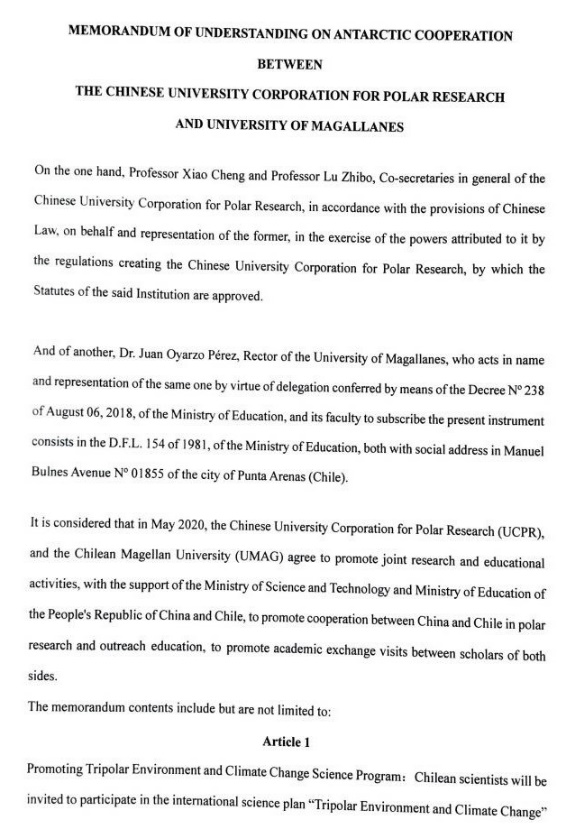On June 22, 2020 (Antarctic Midwinter Festival), under the active promotion of the Embassy of the People’s Republic of China in the Republic of Chile, the Polar Research Institute of Chinese Universities and the Magellan University of Chile signed a memorandum of cooperation. The two sides intend to carry out all-round cooperation in polar science joint research, joint construction of research platforms, talent training, and student exchanges. The Chinese side intends to establish a Sino-Chile Polar Cooperation Joint Secretariat at Sun Yat-sen University and Tongji University, with Professor Cheng Xiao (Chief Scientist of the Polar Ocean and Climate Change Team), Director of the Polar Research Center of Sun Yat-sen University and Professor Lu Zhibo (College of Environmental Science and Engineering from Tongji University Deputy Dean) will serve as the Chinese contact; the Chilean side intends to establish a secretariat at Magellan University, with Dr. Juan Carlos Aravena as the Chilean contact.


The memorandum stipulates that the two parties will carry out academic exchanges and cooperation on the basis of equality, mutual benefit and mutual compliance with each other’s laws. The main contents include: jointly promoting the development of the "Tri-polar Environment and Climate Change" international scientific plan; regularly organizing joint scientific research and investigations, join scientists from both parties to participate in field surveys in Antarctica; establish an international joint scientific research platform to conduct cutting-edge scientific research in the ocean, ecology and environment; promote the sharing of polar space earth observation data; strengthen the communication among young scientists of two sides by establishing joint observation stations or cooperative bases; launch the U20 (Under 20) Future Polar Research Scientist Program to provide a platform for training the next generation of polar scientists with an international perspective.
Founded in 1961, the Magellan University in Chile is the headquarters of the former Chilean State Technical University and has a long history in the Chilean university system. In the field of natural sciences, Magellan University attaches great importance to field investigation and research in Antarctica, and pays attention to environmental changes in the polar regions. In 2020, Magellan University participated in China's 36th Antarctic Scientific Expedition and the 2020 China-Chile Cooperation Comprehensive Geological Expedition in West Antarctica, which has a solid foundation for cooperation with our country.
The Polar Research Institute of China of Chinese Universities was established on April 22, 2018. It is jointly established by more than 30 domestic universities, including Beijing Normal University, Sun Yat-sen University, Tongji University, Ocean University of China, and Jilin University. The main research direction is polar environmental monitoring and simulation, polar changes and global effects, polar region environment and waterway resources, polar region economic and social sustainable development research, etc. At present, the secretariat of the Polar Research Institute of Chinese Universities is operated by the Southern Ocean Laboratory, aiming to integrate the advantageous resources of domestic polar research and strive to build a broad and in-depth polar international cooperation network.
China and Chile are comprehensive strategic partners for each other. The relationship between the two countries has been at the forefront of China-Latin America relations for a long time. This year marks the 50th anniversary of the establishment of diplomatic relations between China and Chile. The signing of this memorandum will actively promote to establish a closer strategic partnership between China and Chile with high-level universities in the polar field. Taking the high-quality advancement of the “Belt and Road” initiative as the starting point, by uniting international superior scientific research forces to forming deeper and broader polar research cooperation, and making greater contributions to jointly addressing global challenges such as climate change and protecting the Antarctic environment.